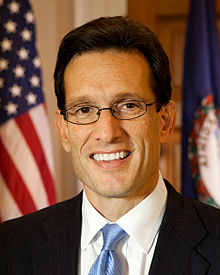 I guess I won’t have Eric Cantor to kick around anymore. As a politician, he has definitely been the enemy. He’s a bad guy, working to make the country worse. But he’s especially noteworthy for being smarmy. Now a lot of politicians are smarmy, but he really made it into an art—he was certainly the best of the national politicians. So I’m not at all sorry to see him go. Anyway, he’ll get a high paying lobbying job and be much richer and happier. So good for him.
I guess I won’t have Eric Cantor to kick around anymore. As a politician, he has definitely been the enemy. He’s a bad guy, working to make the country worse. But he’s especially noteworthy for being smarmy. Now a lot of politicians are smarmy, but he really made it into an art—he was certainly the best of the national politicians. So I’m not at all sorry to see him go. Anyway, he’ll get a high paying lobbying job and be much richer and happier. So good for him.
But do you know what his loss reminds me of? All those middle class college students in the 1960s who thought of themselves as “revolutionaries.” And among them, there was this tendency to try to out-pure each other. “Oh, you think people ought to be able to own their own toothbrush?! Heretic!” Actually, you see this thing all the time in small groups that don’t have power. Tom Wolfe ridicules this in From Bauhaus to Our House in the early days of the Bauhaus movement. Of course, the ultimate example of this comes from Monty Python’s Life of Brian:
And that’s all that went on in Virginia’s 7th District today. No one can seriously say that Eric Cantor isn’t conservative enough. Or that he doesn’t pander to his constituency enough. Or that he isn’t a good politician. But his own party effectively said, “Despite the fact that you are one of the most powerful people in Congress and can do all kinds of good things for our district, we don’t think you are quite pure enough.” And the problem? He didn’t hate immigrants enough.
The thing about this purity race is that all it does is cause whatever the movement is to fracture more and become smaller, and thus calling for even more purity. As I’ve long argued, I don’t mind seeing the Republican Party destroyed. I would mind it if the Democratic Party were not so ripe for a split. But on the one issue that everyone really cares about—the economy—the Democratic Party is two parties: one conservative and one liberal. And if the Republican Party went the way of the Nazi Party and the Democrats broke in half, it would be the best thing to happen to this country since the military buildup of the late 1930s and early 1940s.
So enjoy your riches Eric Cantor. And enjoy not having to represent one of the most ridiculous political movements that America has spawned in the last century. And let’s all just see your loss as the hopeful sign it represents for the future of America.

 There are only two works of fiction that I spend any time at all working on these days. The first is the video series “The Post-Postmodern Comedy Hour.” And it is a very sad. Because nothing I’ve ever written works as well. Nothing I’ve ever written so encapsulates who I am as a person. It is sort of like
There are only two works of fiction that I spend any time at all working on these days. The first is the video series “The Post-Postmodern Comedy Hour.” And it is a very sad. Because nothing I’ve ever written works as well. Nothing I’ve ever written so encapsulates who I am as a person. It is sort of like  Last week, Matt Stoller wrote an excellent review of
Last week, Matt Stoller wrote an excellent review of  The great biologist
The great biologist